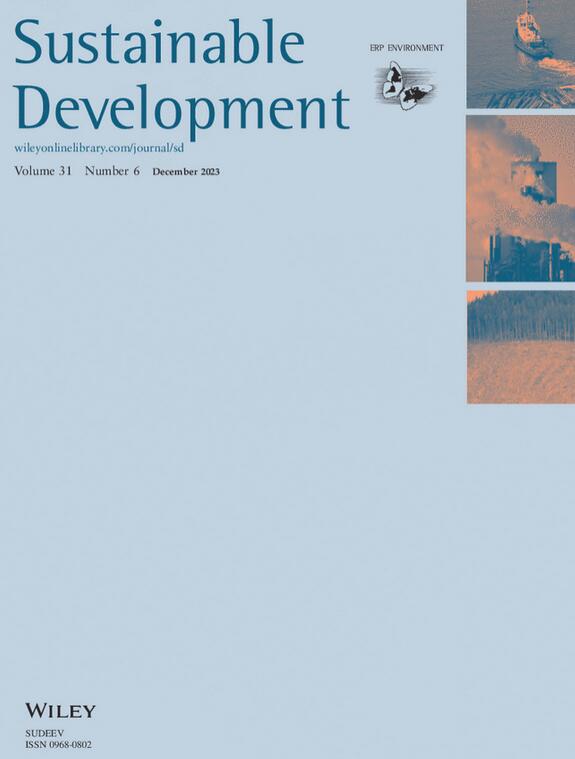面向可持续发展的农田非点源污染治理的公众支付意愿:中国甘肃的选择实验
IF 8.2
1区 环境科学与生态学
Q1 DEVELOPMENT STUDIES
引用次数: 0
摘要
明确农田面源污染治理的公众支付意愿有助于建立公众参与的生态补偿机制。这将减少中国的农业污染及其对环境和食品安全的影响,同时促进可持续发展。然而,研究尚未揭示中国FNSP治理政策框架下的公共WTP。为此,在甘肃省开展了“面向2030年的FNSP治理方案”选择实验,研究了FNSP治理具体措施(减肥、减农药、秸秆资源利用、地膜回收),揭示了FNSP治理的公众WTP及其关键影响因素。混合logit模型结果表明,改善FNSP现状和采取减肥、减药、秸秆资源化利用、地膜回收等不同措施的城市居民边际WTP (MWTP)分别为151.62元、1.33元、7.3元、4.85元、3.16元,说明由于食品安全问题,城市居民对减少农药的偏好最高。同时,最优FNSP治理方案的平均个人WTP为513.02元/年,仅占家庭年收入的3.86‰;最优FNSP治理的区域社会总福利高达203823万元,占2020年GDP的比重为2.81%。这意味着,FNSP治理可以在家庭经济负担较低的情况下带来可观的社会福利。此外,对过去5年食品安全状况有所改善的感知或对食品安全事件的意识可以增强城市居民改变食品安全现状的意愿,被调查者认为食品安全问题越严重,上述效应越强,表明食品安全因素对公众对食品安全治理的WTP有重要影响。该研究的结果强调了找到社会可接受的方式来促进FNSP治理的潜力,并从公众参与和食品安全的角度对相关决策过程提供了见解。本文章由计算机程序翻译,如有差异,请以英文原文为准。
Public willingness to pay for farmland non‐point source pollution governance toward sustainable development: A choice experiment in Gansu, China
Abstract Clarifying public willingness to pay (WTP) for farmland non‐point source pollution (FNSP) governance helps to establish an ecological compensation mechanism with public participation. This will reduce China's agricultural pollution and its environmental and food safety consequences while promoting sustainable development. Nevertheless, research has yet to reveal the public WTP within China's FNSP governance policy framework. To this end, a “2030‐oriented FNSP governance program” choice experiment with specific FNSP governance measures (fertilizer reduction, pesticide reduction, straw resource utilization, and mulch film recycling) was conducted in Gansu Province to reveal the public WTP for FNSP governance and its key influencing factors. Results from mixed logit models show that urban residents' marginal WTP (MWTP) for improving the FNSP status quo and different measures for fertilizer reduction, pesticide reduction, straw resource utilization, and mulch film recycling is ¥151.62, ¥1.33, ¥7.3, ¥4.85, and ¥3.16 annually, respectively, indicating the highest preference for reducing pesticides because of food safety problems. Meanwhile, the average individual WTP for optimal FNSP governance schemes is ¥513.02 annually, accounting for only 3.86‰ of annual household income; the regional aggregate social welfare of optimal FNSP governance is as high as ¥2038.23 million, accounting for 2.81% of GDP in 2020. This means that FNSP governance can bring substantial social welfare with a low household economic burden. In addition, the perception that food safety has improved in the past 5 years or an awareness of food safety incidents can enhance the willingness of urban residents to change the status quo of FNSP: the more serious the respondents perceive food safety problems to be, the stronger the above effects, indicating the critical impact of food safety factors on the public's WTP for FNSP governance. The study's findings highlight the potential to find socially acceptable ways to promote FNSP governance as well as provide insight into the relevant policymaking process from the standpoint of public participation and food safety.
求助全文
通过发布文献求助,成功后即可免费获取论文全文。
去求助
来源期刊

Sustainable Development
Multiple-
CiteScore
17.30
自引率
11.20%
发文量
168
期刊介绍:
Sustainable Development is a publication that takes an interdisciplinary approach to explore and propose strategies for achieving sustainable development. Our aim is to discuss and address the challenges associated with sustainable development and the Sustainable Development Goals. All submissions are subjected to a thorough review process to ensure that our readers receive valuable and original content of the highest caliber.
 求助内容:
求助内容: 应助结果提醒方式:
应助结果提醒方式:


